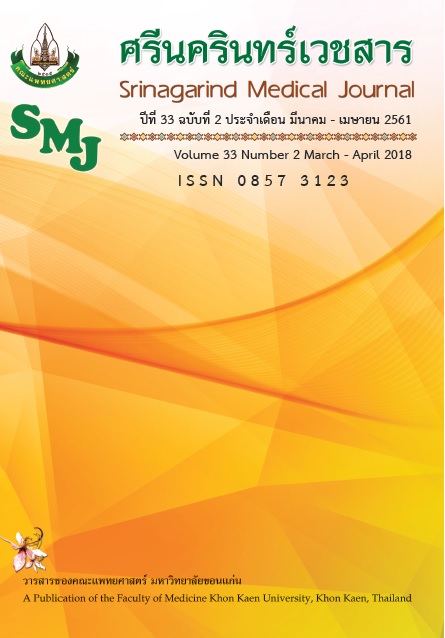The Effect of Melatonin on Memory Deficits Induced by 5-Fluorouracil Chemotherapy in Adult Rats
Keywords:
5-fluorouracil; melatonin; memory; ไฟฟ์-ฟลูออโรยูราซิล; เมลาโทนิน; ความจำAbstract
Background and objective: Melatonin (N-acetyl-5-methoxytryptamine) has antioxidant properties and functions as a free radical scavenger. Interestingly, melatonin modulates neurogenesis and has positive effects on memories in adult rats. 5-fluorouracil (5-FU) chemotherapy is widely used to treat cancer and causes memory deficits. The present study investigated the effects of melatonin on memory deficits induced by 5-FU.
Methods: Male Sprague Dawley rats were divided into 6 groups; control, melatonin, 5-FU, preventive, recovery and throughout groups. Melatonin (8 mg/kg/day) was administered by intraperitoneal injection once a day at 7.00 pm. for 21 days. Rats received 5-FU (25 mg/kg/day) by intravenous injection 5 times every 3 days starting on day 9. In co-treatment groups, 5-FU-treated rats received melatonin once a day at 7.00 pm. for 21 days during treatment (day 1 to day 21, preventive group) or after treatment (day 22 to day 42, recovery group) or both time periods (day 1 to day 42, throughout group). After that, the memories were determined using novel object location (NOL) and novel object recognition (NOR) tests.
Results: The results showed that weight gain of co-treated with melatonin groups was significantly less than control group.All groups were not significantly different in the total exploration time in both NOL and NOR tests. Rats in co-treated groups could significantly discriminate the object between novel and familiar locations in NOL test. On the other hand, co-treatment with melatonin failed to discriminate novel and familiar objects in NOR test.
Conclusion: This study demonstrated that co-treatment with melatonin during or after or both time periods ameliorated spatial memory deficits but co-administration with melatonin did not relieve declarative memory deficits.So, this study demonstrates that spatial memory deficits caused by 5-FU could be attenuated by melatonin administration.
ผลของเมลาโทนินต่อภาวะความจำบกพร่องที่ถูกเหนี่ยวนำโดยยาเคมีบำบัด 5-fluorouracil ในหนูแรทโตเต็มวัย
กรรวี สุวรรณโคตร1, สุชาดา ครุฑศรี1, อนุสราอารณะโรจน์1, ภรณ์ทิพย์ ชัยสว่าง1,วนัสนันท์ แป้นนางรอง1,2, วรรณี ชัยจรูญคณารักษ์1, จริยา อำคา เวลบาท1,2,3*
1ภาควิชากายวิภาคศาสตร์ คณะแพทยศาสตร์ มหาวิทยาลัยขอนแก่น
2ศูนย์วิจัยและพัฒนาผลิตภัณฑ์สุขภาพจากสมุนไพรมหาวิทยาลัยขอนแก่น 3กลุ่มวิจัยและพัฒนาด้านประสาทวิทยาศาสตร์ มหาวิทยาลัยขอนแก่น
หลักการและวัตถุประสงค์: เมลาโทนิน หรือ N-acetyl-5-methoxytryptamine มีคุณสมบัติเป็นสารต้านอนุมูลอิสระ (antioxidant) และ free radical scavenger เมลาโทนินควบคุมการสร้างเซลล์ประสาทใหม่ (neurogenesis) และส่งผลดีต่อความจำในหนูแรทโตเต็มวัยจากการศึกษาก่อนหน้านี้พบว่า 5-fluorouracil (5-FU) ซึ่งเป็นยาเคมีบำบัดที่ใช้ในการรักษาโรคมะเร็ง เป็นสาเหตุทำให้เกิดภาวะความจำบกพร่อง การศึกษานี้จึงได้ศึกษาผลของเมลาโทนินต่อภาวะความจำบกพร่องที่เกิดจากการถูกเหนี่ยวนำด้วยยาเคมีบำบัด 5-FU
วิธีการศึกษา: หนูแรทเพศผู้สายพันธุ์ Sprague Dawley ถูกแบ่งออกเป็น 6 กลุ่ม ได้แก่ กลุ่ม control, กลุ่ม melatonin, กลุ่ม 5-FU, กลุ่ม preventive, กลุ่ม recovery และกลุ่ม throughout โดยที่หนูได้รับเมลาโทนิน (8 มิลลิกรัม/กิโลกรัม/วัน) โดยการฉีดทางหน้าท้อง วันละ 1 ครั้ง เวลา 19.00 น. เป็นเวลา 21 วัน และได้รับยาเคมีบำบัด 5-FU (25 มิลลิกรัม/กิโลกรัม/วัน) ทางหลอดเลือดดำ 5 ครั้ง ทุกๆ 3 วัน โดยเริ่มให้ในวันที่ 9 ของการทดลอง หนูกลุ่มที่ได้รับยาเคมีบำบัด 5-FU ร่วมกับเมลาโทนินได้รับเมลาโทนิน วันละ 1 ครั้ง เวลา 19.00 น. โดยหนูกลุ่ม preventive ได้รับเมลาโทนินในช่วงวันที่ 1-21 ของการทดลอง หนูกลุ่ม recovery ได้รับเมลาโทนินในช่วงวันที่ 22-42 ของการทดลอง ส่วนหนูกลุ่ม throughout ได้รับเมลาโทนินตลอดการทดลองจากวันที่ 1-42 จากนั้นหนูได้ถูกทดสอบความจำโดยวิธี novel object location (NOL) และ novel object recognition (NOR)
ผลการศึกษา: พบว่าหนูกลุ่มที่ได้รับยาเคมีบำบัด 5-FU ร่วมกับเมลาโทนินทุกกลุ่ม (กลุ่ม preventive, กลุ่ม recovery และ กลุ่ม throughout) มีการเพิ่มของน้ำหนักน้อยกว่ากลุ่ม control อย่างมีนัยสำคัญทางสถิติ การทดสอบความจำด้วยการทดสอบ NOL และ NOR พบว่าหนูทุกกลุ่มใช้เวลารวมในการสำรวจวัตถุไม่แตกต่างกัน จากการทดสอบ NOL พบว่าหนูที่ได้รับยาเคมีบำบัด 5-FU ร่วมกับเมลาโทนินทุกกลุ่มสามารถแยกวัตถุในตำแหน่งใหม่ออกจากตำแหน่งเก่าแตกต่างอย่างมีนัยสำคัญทางสถิติ ในทางกลับกันการทดสอบ NOR พบว่าหนูไม่สามารถแยกวัตถุใหม่ออกจากวัตถุเก่าได้ในหนูทุกกลุ่มที่ได้รับยาเคมีบำบัด 5-FU ร่วมกับเมลาโทนิน
สรุป: จากการศึกษาพบว่าการได้รับเมลาโทนินทั้งในช่วงระหว่างที่ได้รับยาเคมีบำบัด 5-FU ช่วงหลังได้รับยายาเคมีบำบัด5-FUหรือได้รับตลอดการทดลองมีผลทำให้การบกพร่องของความจำชนิด spatial ดีขึ้นได้ ในขณะที่การได้รับเมลาโทนินร่วมกับยาเคมีบำบัด 5-FU ไม่ทำให้ความจำชนิด declarative ดีขึ้นดังนั้นการศึกษานี้จึงแสดงให้เห็นว่าความจำบกพร่องชนิด spatial ที่เกิดจากยาเคมีบำบัด 5-FU สามารถดีขึ้นได้เมื่อได้รับการรักษาร่วมกับเมลาโทนิน




